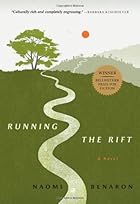 I am an occasional runner. I go through spurts when I am good about getting myself out on the road and putting in miles and other times when I can't motivate myself off the couch. But I have that luxury. Running is never going to substantially change my life, well aside from changing my general fitness level a hair. None of this is the case with the main character in Naomi Benaron's novel Running the Rift winner of the Bellwether Prize for Fiction. He must literally run for his life.
I am an occasional runner. I go through spurts when I am good about getting myself out on the road and putting in miles and other times when I can't motivate myself off the couch. But I have that luxury. Running is never going to substantially change my life, well aside from changing my general fitness level a hair. None of this is the case with the main character in Naomi Benaron's novel Running the Rift winner of the Bellwether Prize for Fiction. He must literally run for his life.Jean Patrick Nkuba is a young boy Tutsi boy living in Rwanda when the novel opens. He likes to race against his older brother outside their home at the boarding school where their father is a teacher. But tragedy comes early to their family when their father is killed in a car accident. After ethnically motivated bullying, Jean Patrick's mother moves the family to her brother's home sooner than planned and away from the school. Jean Patrick and his siblings know that they will have to work harder and be smarter than their Hutu peers in order to go back to the school on a scholarship and have a chance in life. In Jean Patrick's case, not only is he very smart and driven, he is also a very gifted runner whose talents on the track will ultimately carry his Tutsi family, friends, and neighbors' dreams on his back.
As the ethnic violence escalates, Jean Patrick is somewhat protected by his elite athletic status having qualified for the Olympic trials and been given a falsified Hutu identity card by his coach. Jean Patrick is not only driven to run, it literally carries him above the horror played out all over the country. But it can only save him for so long. As he trains hard and tries to shut out the reality of life for his own ethnic minority, he entrusts his coach with his safety and indeed his very life. Jean Patrick's drive and desire, his training regimen even in the face of greater and tighter restrictions, and the politicizing of sport all wind through the narrative no matter what evils overtake the rest of Rwandan society. And it's on a training run that he catches sight of the captivating Bea and meets her Hutu family who risk their own safety to speak out against the killings, a chance meeting that will forever change the trajectory of his life. As he falls in love with Bea, he thinks that he must decide whether his destiny is with her or in his dream of the Olympic track but in fact, there will be no choice. Instead, he will have to run to escape in order to survive and to eventually bear witness to the atrocities.
Benaron has done a good job showing how neighbor can suddenly turn against neighbor and how hatred can grow and consume everything in its path, leaving no one untouched. It translates the impersonality of numbers (over 800,000 people are estimated to have been killed) into the deeply personal tale of one gifted young man and the family and people he loved, showing what genocide means on a micro-level and allowing the reader to feel a kick to the gut in a way that abstract numbers do not inspire. The rising tension as the book progresses is masterful as Jean Patrick doesn't yet seem to understand he is running the race of his life in trying to become an Olympian before full scale bloodshed breaks out. The politics and history behind the 1994 genocide is well researched and well-presented through the use of secondary characters so that it is always fully integrated into the novel. Jean Patrick himself was a naive character and that was occasionally frustrating given the clear and obvious view of what was coming. Not always an easy read (although much of the graphic violence occurs off the page), this is an important look at evil and the slowness of healing in its wake.
Thanks to the publisher for sending me a copy of this book for review.




I received an unsolicited copy of this one, and like most of the unsolicited ARCs I receive, it was passed on to my husband's co-worker. Now I'm thinking I probably should have kept it, LOL.
ReplyDelete